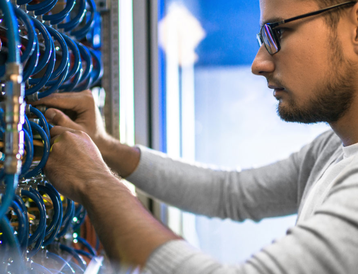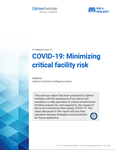Covid-19 is a real and unprecedented crisis, but data centers will come through it. They provide a vital service - more important than ever as people reduce personal contact and rely on electronic communications.
There’s been a rapid increase in digital traffic for online communications services, and this will be sustained as the public is encouraged to keep their distance from each other, while continuing work as far as possible.
Data centers have plenty of resources, and they’re designed to deal with disasters like fires and blackouts. But they haven’t had to face a global pandemic before. What should they do?
First, don’t panic. “Preparedness is in the industry’s DNA,” said Fred Dickerman, SVP at the Uptime Institute, author of a report on minimizing the risk from Covid-19: “Very few organizations have planned for the type of pandemic we are having now. If you don’t have a plan for this in your reference library, you can look for one that can be adapted.”
This feature appeared in the March issue of DCD Magazine. Subscribe for free today.
Staff safety must come first
Uptime’s work on resilience, including the well-known Tier certification scheme, is usually associated with the impact of physical and technical disasters on equipment - but this time the staff are in the firing line.
“From our research, in many conversations we’ve found that the first concern is staff health and safety - as of course it should be,” said Uptime’s research director, Andy Lawrence. It’s not a platitude. The most direct impact that Covid-19 might have on data centers is staff getting ill and not being able to run the service.
So the response has to start at ways to prevent staff getting ill. And, as everyone knows from government advice, that starts with hygiene and ‘social distancing.’
“Data centers tend to be fairly clean but we are going to have to up our game,” Dickerman told an Uptime webinar on Covid-19 risk. “The best information is that the virus lives for two to three days on metal and plastic, and can live for 24 hours on cardboard. It’s not thought to be airborne but it’s still early days, and we may find it lives in the air.”
If part of the facility is potentially contaminated, and it’s possible to seal it off for three days, that may be enough. But, as a basic starting point, Uptime recommends upgrading the cleaning process at facilities - adding disinfection to basic cleaning and making sure the cleaning company they have is able to step up further if a deep clean is needed quickly: “Your data center cleaning crews are going to become an important part of your operation. Consider using a specialist firm, that can do it at short notice.”
Staff have to change their habits and movements, too. Most firms in the sector already make use of teleconferencing and allow home working, so it’s relatively easy to mandate those things. But ingraining better behavior is hard. “You need to change the way your people are thinking during the day to get them into the mindset of avoiding contamination,” said Dickerman.
Clean, clean, and clean again
Staff should be separated into shifts that don’t have contact with each other if possible. “When teams come on and off site, they should do handovers from a distance or by phone,” he said. “Sterilize your physical logbooks - or discontinue them.” In colocation facilities, customers must visit the site less, and follow these same rules.
Key posts must be kept filled: “Uptime has recommended for years that organizations should designate key personal and alternates - and keep them apart,” said Dickerman. If you have two essential network engineers, don’t have them in the same room.
Staff must also understand the need to self-report and don’t come in when they are possibly ill. Supply chains may be disrupted, so spares aren’t available, along with the essentials of life in a data center.
The plan should have phases to bring in if matters become more serious, said Dickerman: “Don’t go to full isolation in one step. Escalate from basic preventive measures to the worst case scenario.” Each stage is triggered by two major factors: how many staff are absent through illness or self-isolation, and what the current government orders are.
If there are travel restrictions or a city goes into lockdown, then sites will need travel permits. In France, these come from the Interior Ministry, and that means applying online, and submitting hygiene procedures, along with a clear statement of the role of the data center. At this point, sharing a written plan is a big help, said Dickerman.
If the site goes into lockdown, it will have to operate lights out as far as possible, but it may be necessary to have staff camping out in the building or in a nearby hotel.
This part of the plan means that the site should have some essential supplies in stock, and a kitchen and shower room good enough that staff can spend some time there.
And if the site does get contaminated, then some applications may need to be moved or paused, while the site is deep cleaned and rebooted.
Through all this, communication is vital, both externally, and internally to make sure staff stay alert:
“People tend to relax after they’ve been in a crisis for ten or twenty days,” warns Dickerman. It’s important they get good information not rumors from social media - and the company has a role to play in making sure people keep their mental health through good interactions.
Finally, Uptime warns there may be more pandemics, so keep the plan ready for next time.





